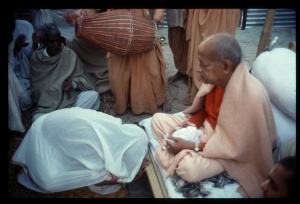CC Madhya 19.170 (1975): Difference between revisions
(Vanibot #0027: CCMirror - Mirror CC's 1996 edition to form a basis for 1975) |
(Vanibot #0020: VersionCompareLinker - added a link to the Version Compare feature) |
||
| Line 2: | Line 2: | ||
<div style="float:left">'''[[Sri Caitanya-caritamrta (1975)|Śrī Caitanya-caritāmṛta (1975)]] - [[CC Madhya (1975)|Madhya-līlā]] - [[CC Madhya 19 (1975)|Chapter 19: Lord Śrī Caitanya Mahāprabhu Instructs Śrīla Rūpa Gosvāmī]]'''</div> | <div style="float:left">'''[[Sri Caitanya-caritamrta (1975)|Śrī Caitanya-caritāmṛta (1975)]] - [[CC Madhya (1975)|Madhya-līlā]] - [[CC Madhya 19 (1975)|Chapter 19: Lord Śrī Caitanya Mahāprabhu Instructs Śrīla Rūpa Gosvāmī]]'''</div> | ||
<div style="float:right">[[File:Go-previous.png|link=CC Madhya 19.169 (1975)|Madhya-līlā 19.169]] '''[[CC Madhya 19.169 (1975)|Madhya-līlā 19.169]] - [[CC Madhya 19.171 (1975)|Madhya-līlā 19.171]]''' [[File:Go-next.png|link=CC Madhya 19.171 (1975)|Madhya-līlā 19.171]]</div> | <div style="float:right">[[File:Go-previous.png|link=CC Madhya 19.169 (1975)|Madhya-līlā 19.169]] '''[[CC Madhya 19.169 (1975)|Madhya-līlā 19.169]] - [[CC Madhya 19.171 (1975)|Madhya-līlā 19.171]]''' [[File:Go-next.png|link=CC Madhya 19.171 (1975)|Madhya-līlā 19.171]]</div> | ||
{{CompareVersions|CC|Madhya 19.170|CC 1975|CC 1996}} | |||
{{RandomImage}} | {{RandomImage}} | ||
==== TEXT 170 ==== | ==== TEXT 170 ==== | ||
| Line 20: | Line 19: | ||
<div class="synonyms"> | <div class="synonyms"> | ||
sarva-upādhi-vinirmuktam—free from all kinds of material designations, or free from all desires except the desire to render service to the Supreme Personality of Godhead; tat-paratvena—by the sole purpose of serving the Supreme Personality of Godhead; nirmalam—uncontaminated by the effects of speculative philosophical research or fruitive activity; hṛṣīkeṇa—by purified senses freed from all designations; | sarva-upādhi-vinirmuktam—free from all kinds of material designations, or free from all desires except the desire to render service to the Supreme Personality of Godhead; tat-paratvena—by the sole purpose of serving the Supreme Personality of Godhead; nirmalam—uncontaminated by the effects of speculative philosophical research or fruitive activity; hṛṣīkeṇa—by purified senses freed from all designations; hṛṣīkeśa—of the master of the senses; sevanam—the service to satisfy the senses; bhaktiḥ—devotional service; ucyate—is called. | ||
</div> | </div> | ||
| Line 27: | Line 26: | ||
<div class="translation"> | <div class="translation"> | ||
" 'Bhakti, or devotional service, means engaging all our senses in the service of the Lord, the Supreme Personality of Godhead, the master of all the senses. When the spirit soul renders service unto the Supreme, there are two side effects. One is freed from all material designations, and, simply by being employed in the service of the Lord, one's senses are purified.' | |||
</div> | </div> | ||
Latest revision as of 11:50, 27 January 2020

A.C. Bhaktivedanta Swami Prabhupada
TEXT 170
- sarvopādhi-vinirmuktaṁ
- tat-paratvena nirmalam
- hṛṣīkeṇa hṛṣīkeśa-
- sevanaṁ bhaktir ucyate
SYNONYMS
sarva-upādhi-vinirmuktam—free from all kinds of material designations, or free from all desires except the desire to render service to the Supreme Personality of Godhead; tat-paratvena—by the sole purpose of serving the Supreme Personality of Godhead; nirmalam—uncontaminated by the effects of speculative philosophical research or fruitive activity; hṛṣīkeṇa—by purified senses freed from all designations; hṛṣīkeśa—of the master of the senses; sevanam—the service to satisfy the senses; bhaktiḥ—devotional service; ucyate—is called.
TRANSLATION
" 'Bhakti, or devotional service, means engaging all our senses in the service of the Lord, the Supreme Personality of Godhead, the master of all the senses. When the spirit soul renders service unto the Supreme, there are two side effects. One is freed from all material designations, and, simply by being employed in the service of the Lord, one's senses are purified.'
PURPORT
This verse quoted from the Nārada-pañcarātra is found in the Bhakti-rasāmṛta-sindhu (1.1.12).